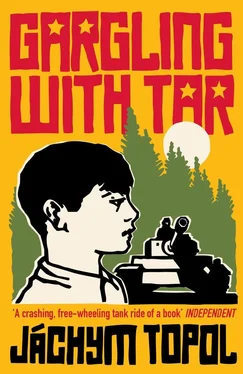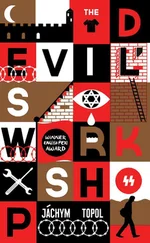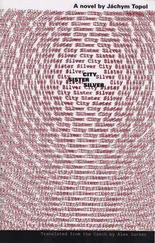Captain Yegorov decided to secure the entire area around the village of Luka. Interrogation of the captives would help us locate the missing circus.
And it began again. The sub-machine-gunners ran forward under cover of the tanks.
Shots crackled again in the village, where only dogs and cats were supposed to be still alive after the opening encounter.
The gunners plunged into the branching underground passages that went from barn to barn, attacked ostensibly invisible bunkers and sneaked up on concealed sniper positions, which they might never have found by themselves, and would have died in the crossfire one by one.
They were lucky that I’d been trained by Commander Baudyš.
Prisoners were marched straight to Captain Yegorov, and his axle-greased face was severe and grim, and all the NCOs wore severe, grim expressions, because the Czech insurgents spat in the venomously contorted faces of the Soviet occupiers, and had only one Russian word, which they repeated endlessly in answer to all questions: ‘ Neznaju .’
And Captain Yegorov couldn’t stand that.
Before long, all the houses in Luka were ablaze, along with the ruins of houses hit previously, and anyone who could, fled from the village into the forest. The rebels carried their injured away, but no-one could help those we had captured. I attended the interrogations, although neznaju didn’t need translating. The last defenders were barricaded in a barn.
Later, I never wanted to talk about this. At the time, I had no-one to talk to. That could be why I picked up a pencil stub in one house and scribbled on my map documents everything about the interrogations and the fate of Luka. I covered lots of sheets. I even wrote down the names of the NCOs who conducted the interrogations. I wrote about everything I saw and everything I noticed.
I took the full sheets and hid them inside the wayside shrine, which by some miracle, perhaps, had survived the destruction. I weighed down the paper with a brick and placed it right at the feet of our Lord Jesus Christ.
Next day the paper wasn’t there. I understood that there’d been further contact between me and the insurgents. I was very glad. None of the captives could say anything about me now, but I had no idea who might have seen me in Luka with the Russians.
15: Neznaju! Happy Song’s mission. Captain Yegorov’s concern. Mermaid
When we had successfully mopped up the area around Luka, our tank column moved on. We found no further traces of the Hygea Circus and our tanks proceeded to the accompaniment of Dago’s swearing and moaning, shackled as he was to the armour plating of the lead tank.
I had plenty of interpreting to do. I translated Czech news bulletins for Captain Yegorov, and when, bent over the tank’s transmitter or twiddling the knobs of the radio in the tent, I caught a hostile Czech broadcast, Captain Yegorov would lean towards me, his careworn features creased with wrinkles.
The first evening after our column left Luka, Commander Žinka addressed Captain Yegorov by name on Radio Free Siřem. He described the hopeless predicament of isolated groups of occupying forces in the Siřem region, as well as the hopeless plight of the Soviet parachutists fighting for their lives in the maze of little streets in the capital of Czechoslovakia, Prague, since from the basement of Prague Castle the heroic statesman Sasha Dubček had declared a nationwide mobilisation, and the highland battalions of Slovak eagles together with the forest battalions of the lions of the Bohemian Basin had the occupying armies in their clutches. Commander Žinka was jubilant and his voice thundered triumphally, and that evening Captain Yegorov punched the radio with his fist and made a particular point of asking me, ‘Who’s broadcasting this?’
‘ Neznaju ,’ I said.
I shouldn’t have said it. It wasn’t something Captain Yegorov liked to hear.
We listened to the news every day, and Captain Yegorov frowned and glowered, because the uprising was gaining ground.
Moravia and Silesia rebelled, and there was violent fighting in the streets of Brno and Ostrava. The focal point of the Brno insurgents was Petrov, which was transformed into a bastion of steel. Traditionally militant Moravian monks, released from Communist internment, teamed up with the people of Brno to form the Citizens’ Company of Saints Cyril and Methodius, and were pushing the occupiers out of the city. The fighters collected mummies from the Brno catacombs and these mummies, armed with the most up-to-date weapons raided from munitions stores, were guarding barricades. By day and by night, illuminated by the flames of countless candles, they formed mobile battlefield altars.
The Polish strategic formations sent into Silesia refused to carry out the orders of the Soviet high command. The heroism of the Poznań Workers’ Division shook the country. The officers were surrounded and, even after being bombarded for two days, refused to lay a hand on the military hardware and attack Czechoslovakia. Soviet palachi , butchers wearing leather aprons, decimated them. Poland was on the verge of an uprising and a state of emergency was declared. Mass activity was being engineered by the workers’ underground organisation Produktiwita .
There was so much news that all it did now was leave us confused. At times I couldn’t care less. Captain Yegorov kept going back to the Radio Free Siřem transmitter.
Captain Yegorov decided to destroy the Radio Free Siřem transmitter.
Its broadcasts referred to our errant tank column quite often. They criticized our actions and spoke of our encounters as massacres. They also spoke of country folk being locked in barns, which then got burnt down. Captain Yegorov must have wondered where the insurgents got their information from. The broadcasts would also make mention of the hoard of gems, watches and church treasures in the captain’s sacks.
I shouldn’t have said neznaju! But what could I do about it?
I trembled at the prospect that one day Captain Yegorov would finally discover the truth about my various detours.
After all, we passed through some places more than once. After a long detour we reached Strabov again, already burnt out from the last time around, and we drove through Tomašín, herding the few people, bandits, who were still defending it into barns
Our errant column pottered about the countryside and the constant killing made us all feel sick. But what could be done? The Russians were alone in a foreign country, and I was alone among them. What could we do?
Dago’s fetters were removed, but Captain Yegorov, infuriated by the dwarf’s inability to offer any explanation as to the fate of the Hygea Circus, kept him tethered to a rope. The end of the rope was entrusted to me.
We sat on the front hull plating, holding tight to the projecting metal and watching the landscape as it rolled by. We kept a sharp lookout for the circus, the soldiers keeping at the ready their picture cards of exotic animals.
It was only then that I learned about the ‘Happy Song’ tank column’s mission. The Soviet military high command had entrusted Captain Yegorov with the special task of making preparations to meet the troops’ needs for leisure and cultural activities in Czechoslovakia. In particular, he was to have created secure conditions for a model Soviet circus. His duty was to demonstrate to the Czechoslovaks and to the rest of the world that the Soviet invasion force was no barbarian horde, but in fact was a vanguard of the most sophisticated culture known to mankind. Project Socialist Circus was intended to prove that socialist circus performers are masters of their art, including the most humane taming and training of exotic animals.
Читать дальше












